Mr. Record Man: Old 97’s
By Richard Skanse
(LSM May/June 2014/vol. 7 – issue 3)
The year 2014 marks the 20th anniversary of the Old 97’s, and here’s the first thing you need to know about that little bit of trivia: Left at face value, it doesn’t mean shit. Because in a world where Rolling Stones still tour the earth, Gene Simmons still dons the clown makeup to hawk KISS crap and Pearl Jam gets played on classic rock radio, a rock ’n’ roll band turning 20 years old really doesn’t merit much fanfare. A pat on the back, perhaps, if said band has somehow managed to stick it out that long with its original lineup (drummer included) intact the whole time, but congeniality and perfect attendance aren’t the kind of things one normally goes around bragging about in the school of rock.
That said, though, here’s the thing about the Old 97’s turning 20 that is noteworthy: In lieu of a self-congratulatory anniversary tour built around a deluxe reissue of their debut album and/or some silly fans-vote-on-the-setlist publicity stunt, they marked the occasion by slamming down the most unrepentantly reckless and delightfully unhinged album of their career. It begins with singer Rhett Miller sauntering straight up to the proverbial third wall, directly addressing the listener with an opening line that might warrant a broken nose for its cocksure, talking-to-a-child dismissive air — if only he weren’t so disarmingly casual about it: “We’ve been doing this longer than you’ve been alive.” By the time the rest of the band sidles up beside him and kicks the nearly six-minute “Longer Than You’ve Been Alive” into high gear, Miller’s already in full swagger, spinning off a warts-and-all tale of “20 good years of about 25” that reels from boast to confession and back again with every verse. From there, the rest of the ridiculously aptly titled Most Messed Up never lets up, making today’s Old 97’s sound not so much 20 years older and wiser than they did on their debut 10 albums back, but 20 times more fit, feisty and full of fight.
 That’s not to say that the young 97’s ever lacked for energy. But it’s not swagger and rakish charm that carried their 1994 debut, Hitchhike to Rhome (Big Iron Records), so much as it was pure pluck and heart — and some pretty great songs. In spite of their youth, the four group members weren’t quite as fresh-scrubbed and wet behind the ears as they looked on the back cover; Miller and bassist Murry Hammond (six years his senior) had already played together for a number of years on the Dallas club scene, having first collaborated on a solo album called Mythologies that Miller recorded while still in high school, while guitarist/accordion player Ken Bethea and drummer Phillip Peeples had both played in a noisy Butthole Surfers-style Denton band called the Smeg Wentfields. Prior to forming the Old 97’s, Miller and Hammond had consciously retreated from playing grunge-era rock in favor of more coffeehouse-friendly, acoustic singer- songwriter fare, and with Betha and Peeples they pooled influences ranging from Johnny Cash to Joe Ely to rockabilly-inflected Los Angeles punk band X. Still, the alt-country sound they hit upon as Old 97’s was rather new territory for all of them, which probably accounts for some of the winsome naiveté that pervades Hitchhike. Hammond’s West Texas drawl does right by Merle Haggard’s “Mama Tried,” and the cover of Cindy Walker’s “Miss Molly” proved they’d done their homework, but overall the Old 97’s’ debut outting didn’t quite convey the insurgent energy of genre forebears like Jason & the Scorchers, let alone the real-deal honky-tonk conviction of Texas contemporaries the Derailers. What set the Old 97’s apart from the crowd, though, was the precocious wit of Miller’s songwriting, with “St. Ignatius” and “504” establishing from the get-go his trademark knack for folding twitchy hormonal angst and bookish wordplay into spry, clever, and catchy little short stories and character snapshots. The brooding “Wish the Worst” proved he could deliver a convincingly bitter barstool lament, too.
That’s not to say that the young 97’s ever lacked for energy. But it’s not swagger and rakish charm that carried their 1994 debut, Hitchhike to Rhome (Big Iron Records), so much as it was pure pluck and heart — and some pretty great songs. In spite of their youth, the four group members weren’t quite as fresh-scrubbed and wet behind the ears as they looked on the back cover; Miller and bassist Murry Hammond (six years his senior) had already played together for a number of years on the Dallas club scene, having first collaborated on a solo album called Mythologies that Miller recorded while still in high school, while guitarist/accordion player Ken Bethea and drummer Phillip Peeples had both played in a noisy Butthole Surfers-style Denton band called the Smeg Wentfields. Prior to forming the Old 97’s, Miller and Hammond had consciously retreated from playing grunge-era rock in favor of more coffeehouse-friendly, acoustic singer- songwriter fare, and with Betha and Peeples they pooled influences ranging from Johnny Cash to Joe Ely to rockabilly-inflected Los Angeles punk band X. Still, the alt-country sound they hit upon as Old 97’s was rather new territory for all of them, which probably accounts for some of the winsome naiveté that pervades Hitchhike. Hammond’s West Texas drawl does right by Merle Haggard’s “Mama Tried,” and the cover of Cindy Walker’s “Miss Molly” proved they’d done their homework, but overall the Old 97’s’ debut outting didn’t quite convey the insurgent energy of genre forebears like Jason & the Scorchers, let alone the real-deal honky-tonk conviction of Texas contemporaries the Derailers. What set the Old 97’s apart from the crowd, though, was the precocious wit of Miller’s songwriting, with “St. Ignatius” and “504” establishing from the get-go his trademark knack for folding twitchy hormonal angst and bookish wordplay into spry, clever, and catchy little short stories and character snapshots. The brooding “Wish the Worst” proved he could deliver a convincingly bitter barstool lament, too.
While the Old 97’s nascent country stylings came off a tad stiff and studied on their first record, they loosened up immeasurably onstage, where their rock and punk tendencies came to the fore to put more bang in their twang and hustle to their shuffles. That was the country show they took on the road, and within a year they were signed to Bloodshot Records — the Chicago-based indie label launched in 1993 that would grow up to be the Sub Pop of y’allternative roots punk and the scruffier, scrappier hemisphere of the Americana music world. Most of Bloodshot’s fame would come after the Old 97’s short stint on the label, but bragging rights for releasing the band’s second album and the one that sparked an honest-to-goodness major-label bidding war went a long ways toward putting the upstart label on the map. 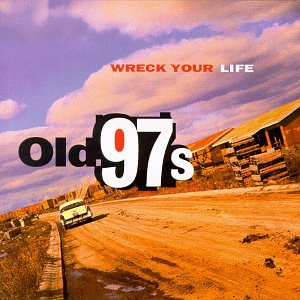 To wit: Bloodshot’s website still calls the 97’s Wreck Your Life (1996) “our first hit record (sort of).” Plenty of hardline, old-school alt-country fanatics (the kind who likely keep a library of every issue of No Depression ever printed, or who stubbornly maintain that Son Volt will always be the better band than Wilco) might even insist that it’s the best Old 97’s album, if only because it was their last before “selling out” and moving up to the majors. They’re wrong, of course, but it is the better of the band’s first two efforts. Although Miller’s lyrics are still the band’s strongest asset here (“This is the story of Victoria Lee/She started off on Percodan and ended up with me/She lived in Berkeley ’till the earthquake shook her loose/She lives in Texas now where nothin’ ever moves”), the performances throughout find the 97’s waking the jagged line between country and rock far more assertively than they did on Hitchhike. Witness their second crack at “Doreen,” an enduring fan favorite first cut as a spry little bluegrass number on their debut; on Wreck Your Life, they ditch the banjos and mandolin but not the frantic tempo, barreling through the paranoid love song like a runaway train — or like a now-seasoned road band done with playing dress up. (As if to drive that point further home, they also forgo banjos on the Hammond-sung cover of bluegrass legend Bill Monroe’s “My Sweet Blue-Eyed Darlin’.”)
To wit: Bloodshot’s website still calls the 97’s Wreck Your Life (1996) “our first hit record (sort of).” Plenty of hardline, old-school alt-country fanatics (the kind who likely keep a library of every issue of No Depression ever printed, or who stubbornly maintain that Son Volt will always be the better band than Wilco) might even insist that it’s the best Old 97’s album, if only because it was their last before “selling out” and moving up to the majors. They’re wrong, of course, but it is the better of the band’s first two efforts. Although Miller’s lyrics are still the band’s strongest asset here (“This is the story of Victoria Lee/She started off on Percodan and ended up with me/She lived in Berkeley ’till the earthquake shook her loose/She lives in Texas now where nothin’ ever moves”), the performances throughout find the 97’s waking the jagged line between country and rock far more assertively than they did on Hitchhike. Witness their second crack at “Doreen,” an enduring fan favorite first cut as a spry little bluegrass number on their debut; on Wreck Your Life, they ditch the banjos and mandolin but not the frantic tempo, barreling through the paranoid love song like a runaway train — or like a now-seasoned road band done with playing dress up. (As if to drive that point further home, they also forgo banjos on the Hammond-sung cover of bluegrass legend Bill Monroe’s “My Sweet Blue-Eyed Darlin’.”)
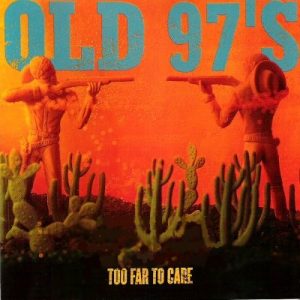 As good as Wreck Your Life was, though (along with most of the material that didn’t make the album, later released by Bloodshot on the terrific eight-song EP Early Tracks in 2000), it was on their next three records — all on Elektra — that the Old 97’s really hit their stride. By any sensible measure, 1997’s Too Far to Care was the high-water mark of the band’s early years; it was also their last album on which they embraced the alt-country genre from start to finish, and they closed off that chapter of their career with a wholly satisfying bang. In between the opening blitz of “Timebomb” and the closing “Four Leaf Clover” (another Hitchhike do-over, this time with band hero Exene Cervenka of X added to the combustible mix), Too Far plays like a best-of in all but name, with at least half of the songs (including “Big Brown Eyes” and Hammond’s “W. TX Teardrops”) remaining staples in the band’s live sets to the present day. But even on an album stuffed full of time-tested fan favorites, “Barrier Reef” stands out as the Old 97’s own “Satisfaction.” From its cocky but drunkenly just-off-kilter swinging verses to its soaring, shout-along-worthy chorus, it’s a perfect storm of everything the band does best honed to perfection. It also serves as pretty boy Miller’s textbook guide to scoring: It doesn’t matter if your opening pick-up line’s a groaner (“My name’s Stewart Ransom Miller, I’m a serial lady killer”), so long as you also come packing a hook to die for.
As good as Wreck Your Life was, though (along with most of the material that didn’t make the album, later released by Bloodshot on the terrific eight-song EP Early Tracks in 2000), it was on their next three records — all on Elektra — that the Old 97’s really hit their stride. By any sensible measure, 1997’s Too Far to Care was the high-water mark of the band’s early years; it was also their last album on which they embraced the alt-country genre from start to finish, and they closed off that chapter of their career with a wholly satisfying bang. In between the opening blitz of “Timebomb” and the closing “Four Leaf Clover” (another Hitchhike do-over, this time with band hero Exene Cervenka of X added to the combustible mix), Too Far plays like a best-of in all but name, with at least half of the songs (including “Big Brown Eyes” and Hammond’s “W. TX Teardrops”) remaining staples in the band’s live sets to the present day. But even on an album stuffed full of time-tested fan favorites, “Barrier Reef” stands out as the Old 97’s own “Satisfaction.” From its cocky but drunkenly just-off-kilter swinging verses to its soaring, shout-along-worthy chorus, it’s a perfect storm of everything the band does best honed to perfection. It also serves as pretty boy Miller’s textbook guide to scoring: It doesn’t matter if your opening pick-up line’s a groaner (“My name’s Stewart Ransom Miller, I’m a serial lady killer”), so long as you also come packing a hook to die for.
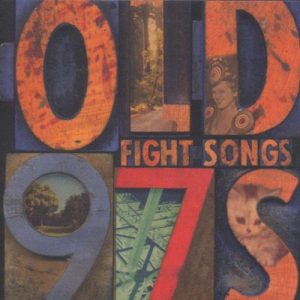 All of the above made Too Far to Care a very tough act to follow, but 1999’s Fight Songs coulda been a contender if only it had a little more eye of the tiger in its tank. It’s got top-notch songs to spare, most notably “Jagged,” “Busted Afternoon,” “Valentine” (Hammond’s finest contribution to date at the time), and especially “Murder (Or a Heart Attack),” in which a panicked Miller loses his shit (but not his melodic cool) over losing his girlfriend’s cat. But as catchy and clever as the songs are, there’s a lack of characteristic Old 97’s spunk and energy to the record as a whole that pulls Fight Songs’ punch. It’s a transitional record, too, marked by more jangle than twang as some of the 97’s (perhaps most tellingly Miller) were beginning to grow wary of being pigeonholed by the sound of their first three albums. Expanding their sonic playing field would serve them well in the long run, but the somewhat hesitant baby steps on Fight Songs belied a certain lack of focus and all-in commitment to changing direction. Correcting that would make all the difference in the world on their next album.
All of the above made Too Far to Care a very tough act to follow, but 1999’s Fight Songs coulda been a contender if only it had a little more eye of the tiger in its tank. It’s got top-notch songs to spare, most notably “Jagged,” “Busted Afternoon,” “Valentine” (Hammond’s finest contribution to date at the time), and especially “Murder (Or a Heart Attack),” in which a panicked Miller loses his shit (but not his melodic cool) over losing his girlfriend’s cat. But as catchy and clever as the songs are, there’s a lack of characteristic Old 97’s spunk and energy to the record as a whole that pulls Fight Songs’ punch. It’s a transitional record, too, marked by more jangle than twang as some of the 97’s (perhaps most tellingly Miller) were beginning to grow wary of being pigeonholed by the sound of their first three albums. Expanding their sonic playing field would serve them well in the long run, but the somewhat hesitant baby steps on Fight Songs belied a certain lack of focus and all-in commitment to changing direction. Correcting that would make all the difference in the world on their next album.
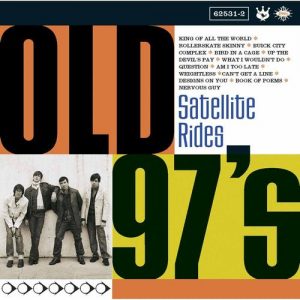 Satellite Rides (2001) was the game changer. Maybe not quite on the same level as Dylan going electric, the Beatles finding their Rubber Soul or U2 chopping down their Joshua tree and shouting “achtung, baby,” but still a decisive turning point for the Old 97’s. For fans along for the ride (or not), this is where you either get off the train for good to seek solace in your copy of Wreck Your Life and wonder where it all went wrong, or strap in, let go of the past, crank it up and sing along with “King of All the World” like it’s one of the greatest pop songs ever — because it pretty much is. Well, at least until its 2 minutes and 52 seconds is up and “Rollerskate Skinny” grabs hold, only to be knocked away itself by “Buick City Complex,” “Bird in a Cage,” and, well, on and on it goes, just blast after blast of mercilessly catchy and breathless exuberance. Halfway through the band does ease off the pedal long enough for the short-but-sweet sigh of “Question,” then gives a little nod and a wink to country with “Am I Too Late” as if to say, “Yeah, we can still do that, if we wanna …” But overall Satellite Rides is pure, unadulterated power pop, and the Old 97’s pull it off so well that no matter how far removed it may be from Too Far to Care, it’s every bit as essential.
Satellite Rides (2001) was the game changer. Maybe not quite on the same level as Dylan going electric, the Beatles finding their Rubber Soul or U2 chopping down their Joshua tree and shouting “achtung, baby,” but still a decisive turning point for the Old 97’s. For fans along for the ride (or not), this is where you either get off the train for good to seek solace in your copy of Wreck Your Life and wonder where it all went wrong, or strap in, let go of the past, crank it up and sing along with “King of All the World” like it’s one of the greatest pop songs ever — because it pretty much is. Well, at least until its 2 minutes and 52 seconds is up and “Rollerskate Skinny” grabs hold, only to be knocked away itself by “Buick City Complex,” “Bird in a Cage,” and, well, on and on it goes, just blast after blast of mercilessly catchy and breathless exuberance. Halfway through the band does ease off the pedal long enough for the short-but-sweet sigh of “Question,” then gives a little nod and a wink to country with “Am I Too Late” as if to say, “Yeah, we can still do that, if we wanna …” But overall Satellite Rides is pure, unadulterated power pop, and the Old 97’s pull it off so well that no matter how far removed it may be from Too Far to Care, it’s every bit as essential.
Of course, you wouldn’t know any of that based on the album’s commercial success; Satellite Rides peaked at No. 121 on the Billboard Top 200 and ended up being the Old 97’s last album on Elektra. It wasn’t Miller’s, though; in 2002 the label released the singer’s first solo album The Instigator (his “first” as in the first that he still claims, having long-since written off the out-of-print Mythologies, with its affected faux Bowie/Morrissey British accent, as a high-school fling). According to Miller, The Instigator was comprised of songs passed on by the rest of the band, which is baffling because most if not all of them (in particular standouts like “Our Love” and “Hover”) would have fit right in on Satellite Rides. At the very least, it’s a lot closer to the spirit of Rides than the next Old 97’s album, 2004’s Drag It Up (their first for New West Records, which would be their home through the rest of the decade.) 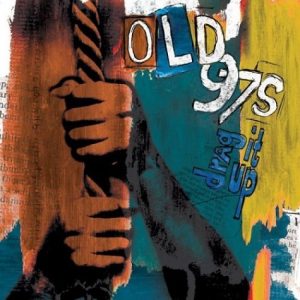 As fresh starts go, it sounds like a band waking up on the wrong side of the bed and burying its head back under the covers. For better or worse, Mark Neill’s murky production certainly fits the mood, drowning songs like “Borrowed Bride” (“life comes apart at the seams, it seems”) in echo and cloaking “Valium Waltz” in a Velvet Underground-y haze. Sometimes the narcotic pace yields real beauty, as in the languid but pretty “Satellite Rides a Star,” but the album’s most redeeming moments come when the band snaps awake and lashes out like a poked bear. The opening “Won’t Be Home No More” and the Hammond-sung “Smokers” throw off some much-welcome kinetic sparks, and the excellent “The New Kid” — note for note one of the most thrilling songs in the entire Old 97’s arsenal — bristles with snarling, frayed-edge dramatic intensity. More often than not, though, Drag It Up is a bit of a drag.
As fresh starts go, it sounds like a band waking up on the wrong side of the bed and burying its head back under the covers. For better or worse, Mark Neill’s murky production certainly fits the mood, drowning songs like “Borrowed Bride” (“life comes apart at the seams, it seems”) in echo and cloaking “Valium Waltz” in a Velvet Underground-y haze. Sometimes the narcotic pace yields real beauty, as in the languid but pretty “Satellite Rides a Star,” but the album’s most redeeming moments come when the band snaps awake and lashes out like a poked bear. The opening “Won’t Be Home No More” and the Hammond-sung “Smokers” throw off some much-welcome kinetic sparks, and the excellent “The New Kid” — note for note one of the most thrilling songs in the entire Old 97’s arsenal — bristles with snarling, frayed-edge dramatic intensity. More often than not, though, Drag It Up is a bit of a drag.
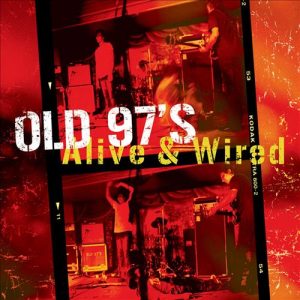 Fortunately, the double-disc Alive & Wired (2005, New West) lives up to its name in spades. The Old 97’s first live album is a 30-track tour de force that not only captures every ounce of sweat and energy of the band (and a suitably hyper-enthused crowd) going for broke over two nights at Texas’ legendary Gruene Hall, but also fits the bill as a highly effective greatest hits survey. A better one for certain than the single-disc 2006 Rhino/Elektra compilation Hit By a Train: The Best of Old 97’s, though the latter does feature the band’s spirited cover of Marty Robbins’ classic “El Paso.” Completists and diehards will want to download that one track and skip over the rest of Hit By a Train in favor of 2012’s They Made a Monster: The Too Far to Care Demos (Omnivore), a surprisingly listenable bare- bones/no-drums peek into the album’s fetal period, and the 2013 Old 97’s & Waylon Jennings EP (Omnivore), which finally brings to light a pair of previously unreleased songs the band cut backing the legendary outlaw — an avowed 97’s fan — in 1997, along with four more 97’s demos from 1996.
Fortunately, the double-disc Alive & Wired (2005, New West) lives up to its name in spades. The Old 97’s first live album is a 30-track tour de force that not only captures every ounce of sweat and energy of the band (and a suitably hyper-enthused crowd) going for broke over two nights at Texas’ legendary Gruene Hall, but also fits the bill as a highly effective greatest hits survey. A better one for certain than the single-disc 2006 Rhino/Elektra compilation Hit By a Train: The Best of Old 97’s, though the latter does feature the band’s spirited cover of Marty Robbins’ classic “El Paso.” Completists and diehards will want to download that one track and skip over the rest of Hit By a Train in favor of 2012’s They Made a Monster: The Too Far to Care Demos (Omnivore), a surprisingly listenable bare- bones/no-drums peek into the album’s fetal period, and the 2013 Old 97’s & Waylon Jennings EP (Omnivore), which finally brings to light a pair of previously unreleased songs the band cut backing the legendary outlaw — an avowed 97’s fan — in 1997, along with four more 97’s demos from 1996.
Career-spanning live albums, retrospectives, and vault releases aside, though, the Old 97’s weren’t done producing new music by a long shot. In fact, the last decade has yielded a bountiful haul of new material from the band, both solo and together. Since The Instigator, Miller has knocked out a handful of other quality solo albums: 2006’s The Believer (Vanguard), 2009’s Rhett Miller (Shout! Factory), 2011’s all-covers The Interpreter: Live at Largo (Maximum Sunshine), 2012’s The Dreamer (Maximum Sunshine), and 2013’s The Dreamer: Acoustic Version (Maximum Sunshine). Hammond also released a quietly beautiful solo set of his own, I Don’t Know Where I’m Going But I’m On My Way (2008, Humminbird). All of those are worth seeking out, but none so much as the Old 97’s 2008 album Blame It On Gravity (New West). 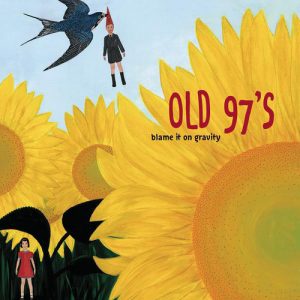 As satisfying as Drag It Up was mostly frustrating, Gravity reclaimed the buoyant rush of Satellite Rides but with a pinch more rootsy character reminiscent of Too Far to Care, finding the perfect balance between the two styles that Fight Songs swung at but never quite hit. Every song’s a keeper, especially Hammond’s two sterling contributions (“This Beautiful Thing” and “Color of a Lonely Heart is Blue”) and the closing “The One,” in which Miller narrates a fantasy about the band pulling off a bank heist. Whether it’s all just a tongue-in-cheek daydream or actually a clever metaphor waxing nostalgic about their days being wined-and-dined by major-label A&R scouts (an early version of the song can be heard on the aforementioned They Made a Monster collection of Too Far to Care demos) is open to interpretation, but either way, it’s a laugh-out-loud hoot.
As satisfying as Drag It Up was mostly frustrating, Gravity reclaimed the buoyant rush of Satellite Rides but with a pinch more rootsy character reminiscent of Too Far to Care, finding the perfect balance between the two styles that Fight Songs swung at but never quite hit. Every song’s a keeper, especially Hammond’s two sterling contributions (“This Beautiful Thing” and “Color of a Lonely Heart is Blue”) and the closing “The One,” in which Miller narrates a fantasy about the band pulling off a bank heist. Whether it’s all just a tongue-in-cheek daydream or actually a clever metaphor waxing nostalgic about their days being wined-and-dined by major-label A&R scouts (an early version of the song can be heard on the aforementioned They Made a Monster collection of Too Far to Care demos) is open to interpretation, but either way, it’s a laugh-out-loud hoot.
Preceeded by the fun but throwaway Mimeograph (2010, New West), a four- song EP of covers bookended by the Rolling Stones’ “Rocks Off ” and David Bowie’s “Five Years,” the Old 97’s next unveiled their most ambitious — at least in theory — endeavor to date: a sprawling, 25-song double album project called The Grand Theatre. Unfortunately, what could have been an epic (if gluttonous) feast was lessened somewhat by the band’s and New West’s admittedly more sensible but less special-feeling decision to spit it in half and release the two parts a year apart, with The Grand Theatre Volume One issued in 2010 and The Grand Theatre Volume Two following in 2011. 
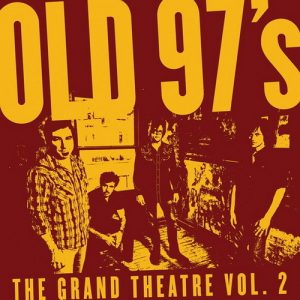 To be fair, there’s still a wealth of good material spread out across the two volumes, and it’s easy enough to make one’s own “complete” Grand Theatre playlist on iTunes. But on their own, neither half feels quite like a wholly satisfying and cohesive album, a la Too Far to Care, Satellite Rides, and Blame It On Gravity, so much as a random collection of mostly pretty good songs thrown together by chance. Quibbles aside, though, as potlucks go it’s a decent spread, with Volume One’s “The Grand Theatre,” “Every Night Is Friday Night (Without You),” “A State of Texas” and “You Smoke Too Much” all worth going back to for seconds, along with Volume Two’s “Perfume,” “No Simple Machine,” and the sublime “How Lovely All It Was” (yet another stunner from the ever-dependable Hammond.)
To be fair, there’s still a wealth of good material spread out across the two volumes, and it’s easy enough to make one’s own “complete” Grand Theatre playlist on iTunes. But on their own, neither half feels quite like a wholly satisfying and cohesive album, a la Too Far to Care, Satellite Rides, and Blame It On Gravity, so much as a random collection of mostly pretty good songs thrown together by chance. Quibbles aside, though, as potlucks go it’s a decent spread, with Volume One’s “The Grand Theatre,” “Every Night Is Friday Night (Without You),” “A State of Texas” and “You Smoke Too Much” all worth going back to for seconds, along with Volume Two’s “Perfume,” “No Simple Machine,” and the sublime “How Lovely All It Was” (yet another stunner from the ever-dependable Hammond.)
While The Grand Theatre, whether taken all-together or in halves, ultimately didn’t quite measure up to the grandeur promised in its name, the new Most Messed Up (2014, ATO) delivers exactly as advertised. Song for song, it’s the Old 97’s’ most rock ’n’ roll record to date: as rollicking as Too Far to Care and tuneful as Satellite Rides, but really closer in spirit, attitude, and execution to the Faces or Stones at their sloppy best or the Replacements at their most endearingly, well, fucked up (’Mats vet Tommy Stinson even turns up on a couple of tracks, most notably the gloriously ornery “Intervention.”) 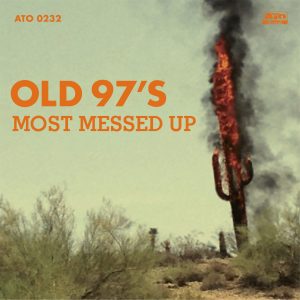 Elsewhere, Miller gleefully drops enough f-bombs that the rest of the band (all of them, like Miller himself, dads of young children) reportedly flinched before collectively saying “fuck it” themselves. The older Stewart Ransom Miller is a lot more direct than his younger self in other ways, too, dispensing with the “I’m a serial lady killer” small talk and cutting right to the chase via “Let’s Get Drunk & Get It On.” And though not every song on Most Messed Up hits as hard and fast as “Intervention,” “Nashville,” and the title track, there are no ballads here: The song actually called “This Is the Ballad” really isn’t, and even Hammond — who’s usually always good for one really pretty song per 97’s album — rocks like a bastard on his one number here, “The Ex of All You See.”
Elsewhere, Miller gleefully drops enough f-bombs that the rest of the band (all of them, like Miller himself, dads of young children) reportedly flinched before collectively saying “fuck it” themselves. The older Stewart Ransom Miller is a lot more direct than his younger self in other ways, too, dispensing with the “I’m a serial lady killer” small talk and cutting right to the chase via “Let’s Get Drunk & Get It On.” And though not every song on Most Messed Up hits as hard and fast as “Intervention,” “Nashville,” and the title track, there are no ballads here: The song actually called “This Is the Ballad” really isn’t, and even Hammond — who’s usually always good for one really pretty song per 97’s album — rocks like a bastard on his one number here, “The Ex of All You See.”
No, subtle the Old 97’s’ latest album most definitely is not. Instead, Most Messed Up is the sound of four 40-somethings taking their younger 20-something selves to task by calling their own bluff and raising the stakes: “Wreck your life, you say? We’ve been doing this longer than you’ve been alive, kids — and this is how it’s done.”
MR. RECORD MAN’S TOP 5 OLD 97’S ALBUM
1. Too Far to Care (Elektra, 1997)
You could start with Hitchhike to Rhome and Wreck Your Life, which chart the rapid development of the Old 97’s into one of the best alt-country bands of the genre’s ’90s heyday, but their third album is where they really got their act together. The songs are as smart as they are fun, as much rock ’n’ roll as they are country, and they still sound as fresh and exciting today as they did way back in the days when a scrappy band of X-loving, insurgent Texas honky-tonkers could get major labels all hot and bothered.
Key Tracks: “Barrier Reef,” “Time Bomb,” “Broadway,” “Four Leaf Clover”
2. Satellite Rides (Elektra, 2001)
The album on which the Old 97’s learned to stop worrying about sticking to alt-country form and just love the joy of playing pure power pop. As invigorating as a shot of adrenaline to heart but a helluva lot more fun. Deliriously catchy from start to finish, and more often than not pretty rocking, too.
Key Tracks: “King of All the World,” “Rollerskate Skinny,” “Buick City Complex,” “Bird In a Cage,” “Designs on You” and, well, the whole rest of the album.
3. Alive & Wired (New West, 2005)
The Old 97’s at their best — live in Texas — blasting through a bulletproof 30-song set list span- ning their first 10 years, covering all the “hits” (“Barrier Reef,” “Time Bomb,” “Jagged,” “Murder (Or a Heart Attack),” “Rollerskate Skinny,” etc.) along with fan-favorite gems plucked from their not-quite-there-yet debut and even a couple of pretty freaking great songs (most notably the fierce “The New Kid”) from 2004’s otherwise sorta dull Drag It Up.
Key Tracks: “The New Kid,” “Won’t Be Home,” “Murder (Or a Heart Attack),” “Wish the Worst”
4. Blame It On Gravity (New West, 2008)
While Alive & Wired showed that the 97’s could deliver the goods onstage, Blame It On Gravity proved they could still come through in the studio, too. The songs might not all be as immediate as the ones on Satellite Rides were, but there are hooks aplenty here along with a pleasing undercurrent of their old-school alt-country sound. Every 97 is in peak form on this one, but bassist Murry Hammond takes MVP honors for writing and singing the two best songs, the up-lifting “This Beautiful Thing” and the achingly lovely “Color of a Lonely Heart Is Blue.”
Key Tracks: “This Beautiful Thing,” “The One,” “Color of a Lonely Heart Is Blue,” “The Fool”
5. Most Messed Up (ATO, 2014)
The title of this one says it all. Ten studio albums and 20 years into their career, the Old 97’s stare down their mid-life crisis like willful SOBs who refuse to sober up, fly straight, sit their asses down and play boring folk tunes when they can still get drunk and “get it on” better than ever. After all, they may be all grown-up now with families and kids, but all grown-up men gotta work; and as they say from the get-go on “Longer Than You’ve Been Alive,” shaking their asses and rocking out every night isn’t just what these guys do to make a living, it’s really all they want to do.
Key Tracks: “Longer Than You’ve Been Alive,” “Nashville,” “Most Messed Up,” “Intervention,” “Let’s Get Drunk & Get It On”




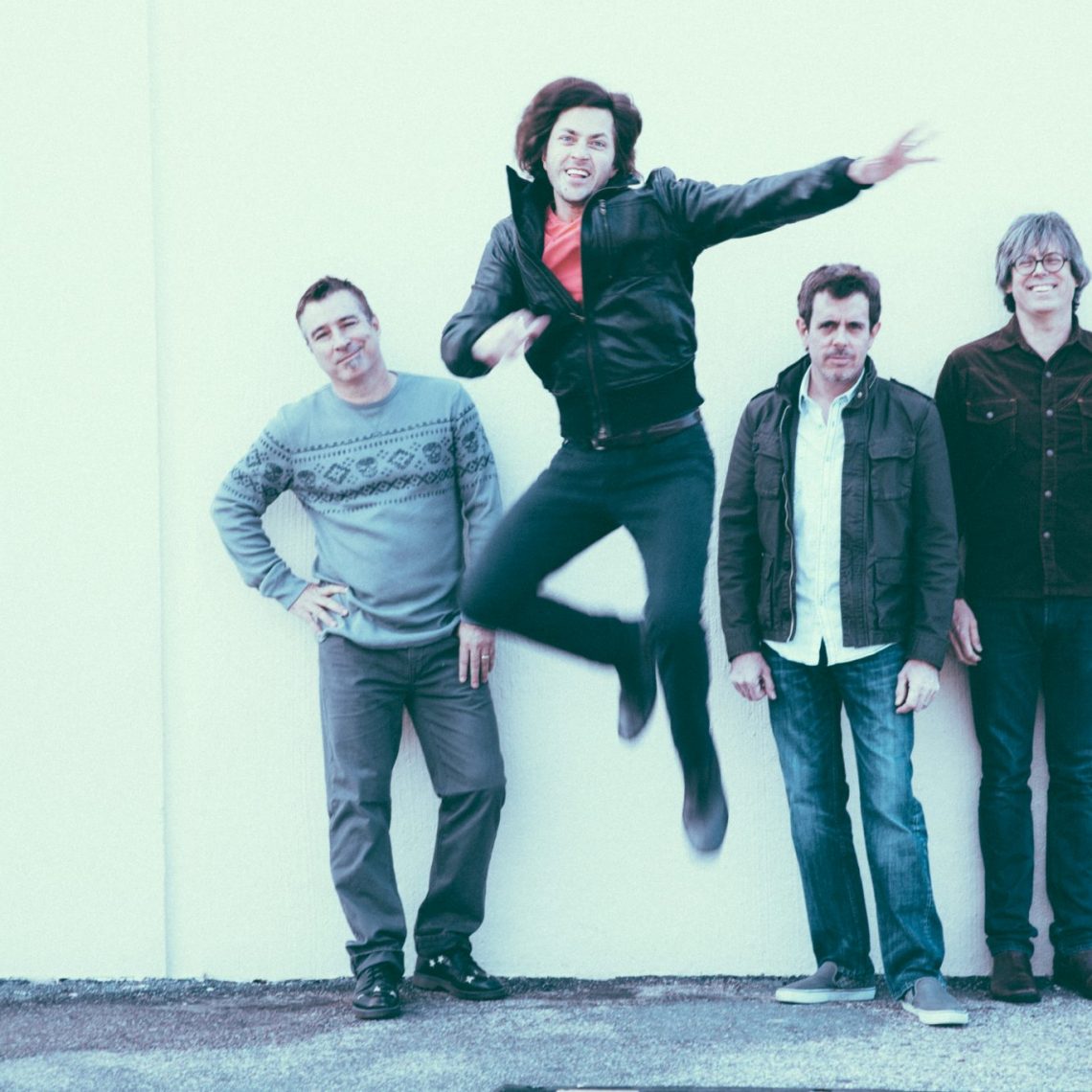
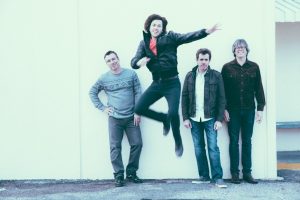

No Comment